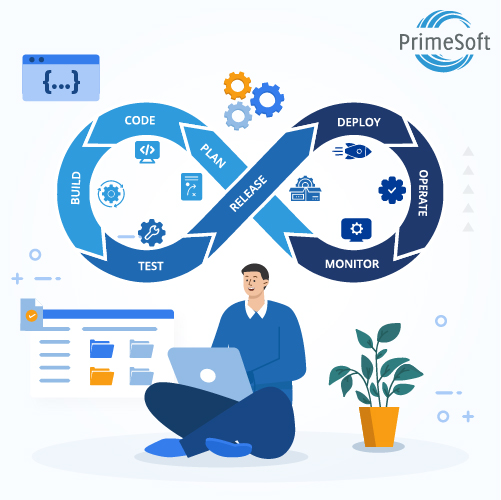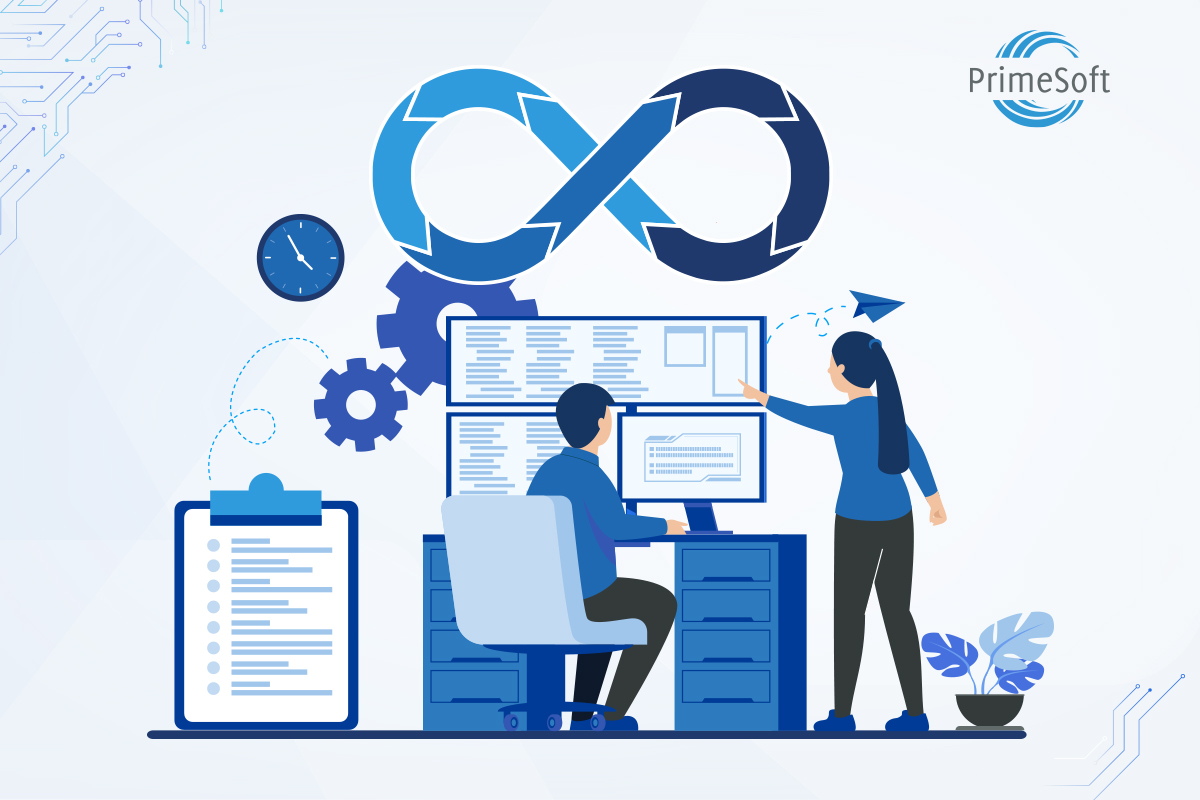Advancement in technology has streamlined business processes in the most effective ways. Companies that are fast enough to adapt to these new trends gain a competitive edge over their counterparts. To scale businesses and ensure the best user experience, the decision-makers need to be agile and rope in the latest technology and services. Many small and big enterprises use the hybrid structure of on-premise infrastructure and cloud systems. Several others still have their apprehensions about taking the leap and migrating to cloud services.
Outsourcing Cloud and DevOps services can help you in your cloud transformation journey. Subscribing to these services can help you better collaborate, monitor, automate, and adopt the cloud into your business to achieve higher efficiency, greater agility, fast-paced deployment, and quicker time-to-market.
What are we going to cover in this blog?
- What is Agile Methodology?
- What is Agile Methodology in software development?
- What is DevOps and how it works?
- Why do we need DevOps?
- What is SecOps?
- How different is SecOps from DevSecOps?
- Why do we need SecOps?
- What is FinOps?
- Why do we need FinOps?
- What is AIOps?
- Why do we need AIOps?
- Can embracing these latest cloud trends accelerate business processes?
When it comes to product development, the process goes beyond the simple plan, development, and delivery model. It needs to be powered by cloud-based services. Today, tech terms like DevOps, SecOps, FinOps, and AIOps are not new to people. But, are they fully aware of these and their benefits? How can these recent trends be adapted to accelerate the product development process?
These are not simply terms that are clubbed with the word ‘Ops.’ This quirky combination of words holds a lot of significance in product development. DevOps, SecOps, FinOps, and AIOps work in tandem in the software development process. However, these trends, especially DevOps, are often confused with Agile Methodology. So, before we dive deep into these term concepts, let’s understand how similar or different these are from Agile Methodology.
What is Agile Methodology?
Agile methodology is specifically designed for project management and software development teams to provide the best customer experience through its interactive and quick response approach. The Agile methodology process helps break down the entire software development process into multiple phases and ensures continuous evaluation. It is known for its iterative approach that involves constant collaboration between the stakeholders and developers to identify opportunities, eliminate bugs and implement changes faster at every stage. These smaller units are integrated at the end for final testing. The whole idea is to align the development process with customer needs and software requirements. It is an effective process where teams work together to add more value for customers and make it more reliable for them. Three commonly used agile frameworks for product development are Scrum, Kanban, and Extreme Programming (XP).
Agile methodology cycle
Plan – Design – Develop – Evaluate
What is Agile Methodology in software development?
- Improves customer experience as it makes the product or software more user-friendly through its iterative approach
- Improves productivity and quality as the methodology encourages to work in small teams who are focused on one phase at a time
- Ensures high performance as the development process is tracked in every stage to add new opportunities and implement changes constantly
- It primarily focuses on three core areas – collaboration, customer feedback, and small rapid releases throughout the Software Development Life Cycle (SDLC) process
What is DevOps and how it works?
DevOps is a core part of the product development process, which brings the software development and IT operations teams together. It eradicates the challenges of the traditional structure and establishes collaboration between these two teams throughout the application lifecycle. In simpler terms, DevOps is a culture that is put into action to accelerate delivery by automating and integrating the phases from design to product release.
Many companies have started adopting the DevOps culture, practices, and tools to digitally transform their business and maximize productivity. DevOps has been in the trend because it is not just a union between two core teams but also an efficient way to bridge the gap between the business, stakeholders, and customers. Unlike the traditional software development and infrastructure management process, DevOps enables organizations to provide value to their customers by delivering applications and services faster. It aligns multiple functions under the same realm, from development and testing to deployment and operations.

DevOps methodology cycle
Plan-Build-Test-Deliver–Deploy-Operate-Monitor
Why do we need DevOps?
Terms like CloudOps and ITOps, once popular among businesses, have now been overshadowed by upgraded and more functional concepts introduced in the modern Ops. One among those is known as DevOps. Ever wondered why? Please take a minute here to analyze what exactly you think has been missing in your software development process? Now read on to understand how DevOps methodology can play a key role in automating processes and achieving business goals. Let’s talk about how it can benefit your organization.
- It doesn’t only focus on software development but ensures end-to-business solutions to its customers. It eliminates the involvement of any third-party vendors and directly meets the software as well as hardware needs of the customer
- Continuous collaboration between teams and customers leads to optimum productivity resulting in high-quality products
- Delivery of applications and services are moved at high velocity. The task is divided and distributed between development and operation teams as per their skill set to run the process seamlessly
- It makes things easier by automating, integrating, and deploying the software faster and more efficiently
- DevOps culture gives the scope for improvement and innovation in software development. It enables frequent releases where teams can innovate and rapidly adapt changes as per customer feedback and software requirement
- DevOps increases reliability as its continuous integration and continuous delivery practices ensure that each change is safe and functional
Though DevOps streamlines the software development process from build to deploy, what about security? Let’s move beyond DevOps and focus on the new Ops cultures emerging in the market that can help you grow your business. Let’s start with cloud SecOps.
What is SecOps?
SecOps establishes a better collaboration between IT security and operations teams who work together to identify and prevent security threats on IT systems. So, a highly skilled team of developers, programmers, and IT security come together to monitor and assess risk and protect the company’s assets.
SecOps culture and practices ensure that the entire team is aware of and responsible for security. Every member of the development cycle team must immediately report any suspected cyber threat so that the same can be mitigated before it becomes an issue. The aim is to improve business agility by keeping the systems and data secure. So, teams are encouraged to operate together and develop practical and adequate IT security measures.
Curious minds will question why these security challenges can’t be fixed with DevOps solutions. That’s because a large number of DevOps-driven application deployment tech adds to the security issues. Hence, the integration between DevOps and SecOps was invented.
How different is SecOps from DevSecOps?
DevSecOps facilitates collaboration and communication to integrate security into applications during the development cycle rather than treating it as an afterthought.
Though DevSecOps and SecOps tend to overlap, the fundamental difference is that DevSecOps injects security into the application development cycle. In contrast, the latter ensures security and compliance for IT systems on which the company assets are stored, including the app and its data.
Why do we need SecOps?
The global pandemic brought in the demand for remote work culture among organizations. This has significantly increased cyber security risks and the challenges to eradicating those. So, companies have started relying on dedicated SecOps teams who proactively work to detect, prevent and mitigate cyber threats. Some of its essential benefits are:
- Enables businesses to identify security concerns and develop solutions rapidly
- Ensures prevention of risks through process definition
- Continuously monitors activities in IT systems and keeps the assets and data secure
- Gets to the root of a security breach incident and prevent it from future occurrences
- Automates important security tasks which keep the records intact, hence making the auditing process more efficient
- The collaboration between teams ensures quick and effective response
- Increases productivity and streamlines businesses processes
To put these trends into action, finances play an important factor. It is essential to keep a tab on the company’s finances and cut down on unnecessary expenses. This money management can be optimized by setting up a strong cloud FinOps operation.

What is FinOps?
These days, especially after the pandemic began, the demand for cloud migration from an on-premise infrastructure has been increasing rapidly among companies. Though this shift to the cloud can save you a lot of money, it is challenging to maintain finances on the cloud. FinOps, also known as cloud financial management, is an effective framework that lets you take control of your cloud spending.
As an organization, it may be difficult for you to keep a track of all the things you are paying for and whether they add any value to your requirements or not like an outdated service, tool, or even a license. FinOps is a cultural practice that enables organizations to maintain, manage and optimize cloud expenses, hence reinstating the core objective of deriving maximum value for minimal spending.
FinOps Framework
Inform, Optimize, Operate
Why do we need FinOps?
The key objective of any business is to draw a balance between speed, cost, and quality. With the use of FinOps, this objective can be put into action. There are many reasons why organizations must adopt FinOps services and some of which are:
- Establishes financial planning and governance to ensure maximum benefits
- Provides complete transparency to control cloud costs and helps your teams to keep track of what they are spending and why
- Enables you to take ownership of your cloud usage and set the cloud budget
- Manages costs across departments
What is AIOps?
Anyone even with the slightest interest in the latest tech trends must be aware of Artificial Intelligence (AI), machine learning (ML), and big data. But what exactly is AIOps, and how can it be applied to your business?
In 2017, Gartner introduced Artificial Intelligence for IT Operations (AIOps) to the world and proved that digital transformation is incomplete without it. It is a platform that applies AI, machine learning, big data, and other analytic techniques to enhance IT operations.
AIOps enables collaboration and automation within a team and helps accelerate the delivery of various services to provide the best customer experience. It can turn out to be highly essential for an enterprise with cloud-based IT infrastructure as AIOps can reduce your cloud costs and improve cloud security through AI automation.
In short, AIOps implements smarter and more intelligent IT operations by allowing access to data from multiple sources, which can be shared across all teams for automation and analytics.
Why do we need AIOps?
IT organizations equipped with the latest technologies can identify, prevent and fix performance problems. However, as we grow with technology, it introduces new roadblocks in our direction. The hybrid multi-cloud infrastructure can create a lot of confusion and complexities about the big data accumulated from multiple sources. In situations like these, AIOps can act as a savior. Drawn by its brilliant practices and tools, businesses have rapidly started to adopt AIOps to make their IT operations more efficient. Read on to learn why your business needs AIOps.
- It collects data and breaks those down into different units providing end-to-end visibility across IT systems. This helps teams to monitor data and network effectively
- Its AI capabilities enable businesses to predict and prevent future problems by identifying the root cause
- It is a next-generation IT solution that monitors applications and infrastructure within an organization and enhances its IT operations functions and performance
Can embracing these latest cloud trends accelerate business processes?
Yes, it certainly can! Practices and processes in digital space evolve every single day. It is necessary to catch up with the trends and stay updated with the latest technologies. However, it is not going to be an easy task and requires a lot of your time and effort. Subscribing to a credible Cloud and DevOps service provider can cushion your cloud journey and help you give your business a ‘face-lift’ much faster.
PrimeSoft’s Cloud and DevOps services help businesses overcome unique challenges and generate value with enhanced security and faster performance in applications. Our software development and operation teams work together to deliver quality products using Azure, AWS, and Google Cloud platforms. We believe in providing services that are defined and delivered as per the specific requirements of our clients. Our client service speaks volumes about our work ethics and culture.
Primesoft is a global IT service provider with expertise in Product Development, Cloud + DevOps, and Quality Assurance. Our in-house industry experts can guide you to make more informed choices and serve your unique needs. And if you still feel unsure or need more clarity on this, we are here to help you out!
Please feel free to reach out to us with your ideas in the comments below. You will hear from us at the earliest.
